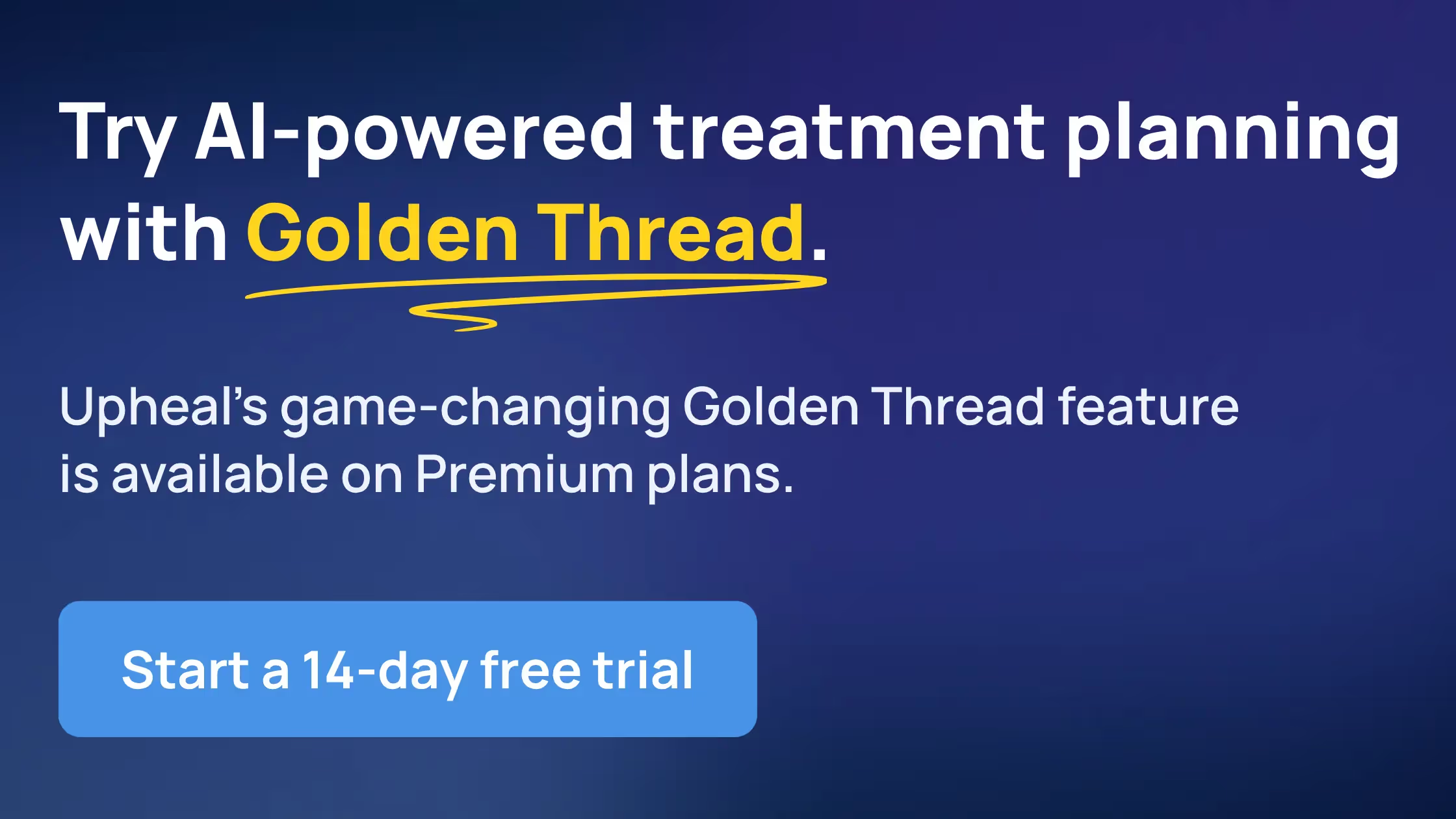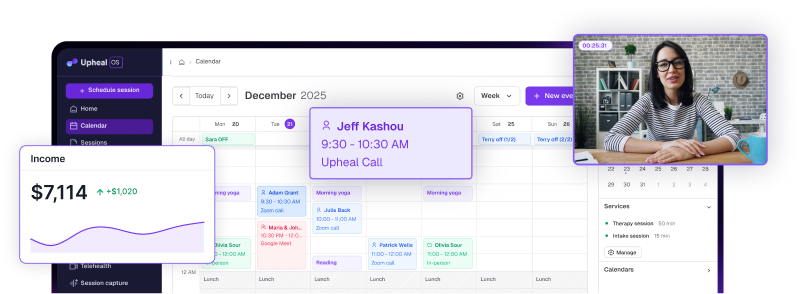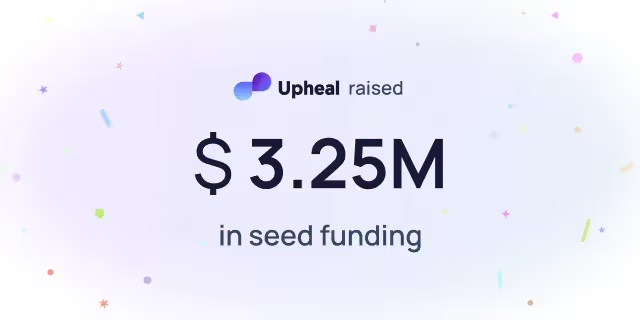Best note-taking app for therapists in 2025

Documentation sits at that frustrating intersection where therapeutic expertise meets administrative necessity. You've just wrapped up a breakthrough session, and now you're staring at blank progress note templates, trying to capture therapeutic nuance in compliant clinical language.
Mental health professionals spend roughly 20-30% of their workweek wrestling with therapy notes, treatment plans, and administrative tasks. It's essential work, but it often pulls you away from what matters most: helping people heal.
AI-powered documentation platforms promise to flip this script entirely. Instead of documentation draining your energy after meaningful therapeutic work, it becomes a seamless extension of your clinical expertise.
1. Upheal: best note-taking app for therapists
Upheal was built specifically for mental health professionals who understand that documentation should enhance, not interrupt, therapeutic relationships. While other platforms treat clinical documentation as generic transcription, Upheal understands therapeutic nuance.
⭐️ What makes it exceptional:
- Unlimited AI-generated notes completely free, with premium features starting at $19/month
- Explicit opt-in consent required before any client data touches AI training models
- 95% accuracy real-time transcription that understands therapeutic language patterns
- Golden Thread treatment planning that creates cohesive clinical narratives across sessions
- Smart Sections enabling unlimited customization with your own AI prompts
- Advanced session analytics providing therapeutic insights and professional development feedback
- Eight-language support for culturally responsive care
Clinical impact is measurable: therapists report 73% reduction in documentation time while improving note quality and consistency. The platform's AI understands intervention terminology, clinical reasoning patterns, and therapeutic relationship dynamics that define authentic behavioral health documentation.
2. Blueprint: good for structured protocols
✅ Strengths: Blueprint excels in evidence-based framework integration with sophisticated treatment protocol management. The platform connects treatment goals directly to progress notes, creating clear documentation trails that satisfy regulatory requirements.
⚠️ Challenges:
- Blueprint's rigid structure constrains therapeutic spontaneity and personalized intervention documentation.
- The platform's emphasis on standardized approaches may limit clinical creativity and diverse therapeutic modalities.
- Privacy policies do not grant clients any autonomy in how their data is stored and/or used.
3. Freed: good for quick documentation
✅ Strengths: Freed emphasizes rapid note generation with efficient transcription capabilities across all healthcare specialties. The platform offers proven reliability in diverse medical settings with comprehensive EHR integration.
⚠️ Challenges:
- At $90/month per clinician, Freed represents one of the most expensive options available.
- The general medical focus lacks behavioral health specialization, missing therapeutic context understanding essential for mental health documentation.
- The platform requires session recordings to function, which may not suit all therapeutic relationships or practice settings.
4. Mentalyc: good for budget-conscious practices
✅ Strengths: Mentalyc specifically targets behavioral health with cost-effective pricing starting at $39/month. The platform offers mental health-focused templates and Alliance Ginie™ analytics for therapeutic alliance measurement.
⚠️ Challenges:
- Heavy reliance on manual template-based approaches without advanced AI automation significantly limits efficiency gains.
- The platform lacks real-time transcription capabilities, requiring substantial post-session documentation time.
5. Heidi: good for multi-specialty practices
✅ Strengths: Heidi extends beyond mental health into comprehensive medical documentation, offering broad healthcare application support with automated referral letter generation and multiple language capabilities.
⚠️ Challenges:
- The generalist medical approach dilutes effectiveness for therapeutic process documentation.
- Complex therapeutic interventions often lose essential clinical context within the platform's generalized healthcare framework.
6. AutoNotes: good for basic automation
✅ Strengths: AutoNotes provides entry-level automated documentation at $25/month with simple transcription capabilities and basic template customization options.
⚠️ Challenges:
- Limited therapeutic context understanding affects clinical note authenticity and depth.
- The platform lacks sophisticated AI capabilities for complex case documentation and offers minimal transparency regarding data usage policies.
- Security features fall below enterprise-level requirements, potentially limiting professional adoption.
What to look for in therapeutic documentation platforms
🔒 Privacy transparency and consent models
Leading platforms require explicit opt-in consent from both therapist and client before any session data touches AI training models. Transparent privacy practices protect therapeutic relationships while enabling technological advancement.
🛋️ Therapeutic context understanding
Optimal solutions recognize mental health-specific language patterns, intervention types, and clinical reasoning structures unique to behavioral health practice. Generic medical scribes often miss therapeutic nuance essential for authentic documentation.
🎯 Treatment plan integration
Advanced platforms seamlessly connect therapy notes with treatment plans, creating cohesive clinical narratives that support continuity of care and outcome measurement. This Golden Thread approach ensures individual sessions contribute meaningfully to larger therapeutic goals.

🤸♂️ Customization flexibility
Therapeutic approaches vary significantly across modalities and client populations. Documentation platforms must accommodate diverse clinical styles through customizable templates and intelligent prompting capabilities.
🤝 Workflow integration
Seamless compatibility with existing EHR systems and practice management platforms ensures comprehensive workflow continuity without technological disruption that creates additional administrative burden.
You should try AI tools for yourself.
The reality is simple: you can't know if AI documentation works for your practice until you actually try it with real sessions and real clients. Reading about features is one thing—experiencing how AI captures your therapeutic style is entirely different.
Upheal removes that barrier with unlimited AI-generated notes completely free. No trial periods, no credit card requirements, no limitations on note types. Generate therapy notes from session recordings, written summaries, or dictation—whatever fits your workflow.
This isn't about making a purchasing decision today. It's about discovering whether AI documentation can genuinely improve your practice without any financial risk. Many therapists are surprised by how quickly they adapt to AI-assisted documentation and how much mental space it frees up for client care.
Start with a single session. See how Upheal captures your clinical language and therapeutic interventions. If it enhances your practice, explore the advanced features. If it doesn't fit your workflow, you haven't lost anything except a few minutes of experimentation.
The future of therapeutic documentation is here, and it starts with trying unlimited AI notes for free.











